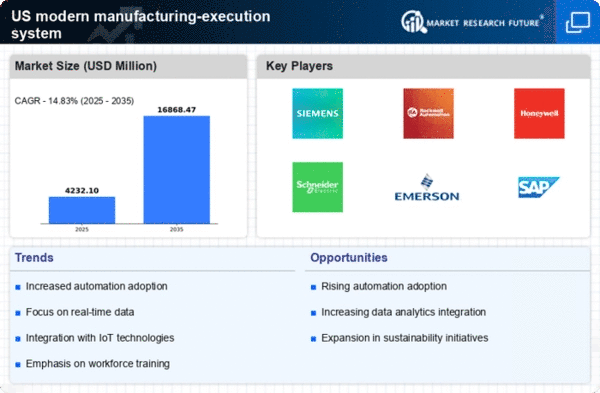Adoption of Industry 4.0 Practices
The modern manufacturing-execution-system market is significantly influenced by the adoption of Industry 4.0 practices. This paradigm shift towards smart manufacturing involves the integration of cyber-physical systems, IoT, and cloud computing into manufacturing processes. As of November 2025, it is estimated that over 50% of US manufacturers have begun implementing Industry 4.0 technologies, which enhance connectivity and automation. The modern manufacturing-execution-system market is expected to expand as companies seek to align their operations with these advanced practices. The ability to collect and analyze data from interconnected devices allows for improved decision-making and operational efficiency. Therefore, the transition towards Industry 4.0 is a critical driver for the growth of the modern manufacturing-execution-system market, as it fosters innovation and competitiveness in the manufacturing sector.
Rising Demand for Real-Time Data Analytics
The modern manufacturing-execution-system market is experiencing a surge in demand for real-time data analytics. Manufacturers are increasingly recognizing the value of data-driven decision-making, which enhances operational efficiency and productivity. According to recent statistics, approximately 70% of manufacturers in the US are investing in advanced analytics tools to optimize their production processes. This trend is likely to continue as companies seek to leverage data insights for better resource allocation and process improvements. The integration of real-time analytics into manufacturing execution systems allows for immediate identification of bottlenecks and inefficiencies, thereby facilitating timely interventions. As a result, the modern manufacturing-execution-system market is poised for growth, driven by the need for enhanced visibility and control over manufacturing operations.
Growing Emphasis on Supply Chain Resilience
The modern manufacturing-execution-system market is increasingly driven by the need for supply chain resilience. In the face of global uncertainties, manufacturers are recognizing the importance of robust supply chain management to mitigate risks and ensure continuity. As of November 2025, around 55% of US manufacturers are investing in technologies that enhance supply chain visibility and responsiveness. Modern manufacturing-execution systems play a crucial role in this context by providing real-time insights into supply chain operations, enabling manufacturers to respond swiftly to disruptions. The focus on building resilient supply chains is likely to propel the growth of the modern manufacturing-execution-system market, as companies seek to enhance their operational agility and maintain competitive advantage in an unpredictable environment.
Regulatory Compliance and Quality Standards
Regulatory compliance and adherence to quality standards are pivotal drivers in the modern manufacturing-execution-system market. Manufacturers in the US are increasingly required to comply with stringent regulations and quality benchmarks, which necessitate the implementation of robust manufacturing execution systems. Approximately 65% of manufacturers report that compliance with industry regulations is a top priority, influencing their investment decisions. Modern manufacturing-execution systems facilitate compliance by providing traceability, documentation, and reporting capabilities that meet regulatory requirements. As the landscape of regulations continues to evolve, the demand for systems that ensure compliance and maintain quality standards is likely to grow. This trend underscores the importance of modern manufacturing-execution systems in helping manufacturers navigate complex regulatory environments while maintaining operational excellence.
Increased Focus on Workforce Training and Development
In the modern manufacturing-execution-system market, there is a growing emphasis on workforce training and development. As manufacturing technologies evolve, companies are investing in upskilling their workforce to effectively utilize advanced manufacturing execution systems. Reports indicate that around 60% of manufacturers in the US are prioritizing employee training programs to ensure that staff are proficient in using new technologies. This focus on training not only enhances employee productivity but also reduces the likelihood of operational errors. Furthermore, a well-trained workforce is essential for maximizing the benefits of modern manufacturing-execution systems, as it enables organizations to fully leverage the capabilities of these systems. Consequently, the modern manufacturing-execution-system market is likely to benefit from this trend as companies strive to create a skilled workforce capable of driving innovation.
















